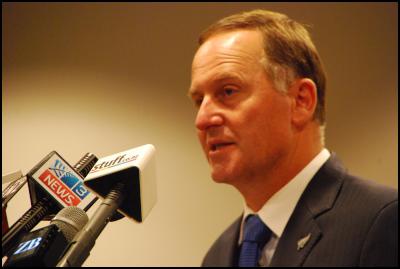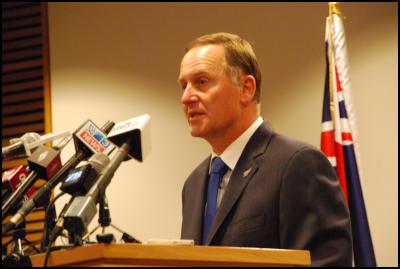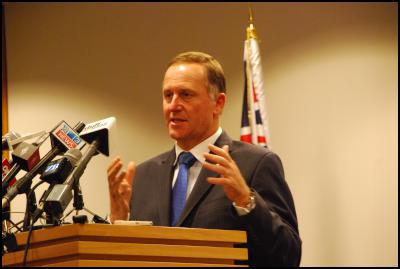PM: Afghan 'Withdrawal' | Royal Succession | Chch Schools
PM Post-Cabinet Press Conference - 18 Feb 2013
By Mark P.
Williams
Today the Prime Minister spoke about New Zealand's putative withdrawal from Afghanistan, the decisions on the closure or merger of Christchurch schools, and the changes in New Zealand law regarding the Royal succession.
He announced what he called a change of role for the NZDF forces in Afghanistan, which would mean the withdrawal of the vast majority of New Zealand personnel from Bamyan province and from Afghanistan. Twenty-seven personnel would be remaining, including three SAS members, working "behind the wire" in primarily support, planning and logistics.
He took time to emphasise the benefits that had been brought to Bamyan under the NZDF, listing the largest solar power station in Afghanistan, which he said would bring electricity to 2,500 homes and businesses. The Prime Minister also said that Bamyan University now has 2,700 students, 15% of whom are female.
Of the 31 Christchurch schools under threat of closure or merger, the Prime Minister said that seven would be closing; twelve would now remain open, while a further twelve will merge into six schools.
He then announced a change in New Zealand law regarding the Royal succession allowing an elder daughter to succeed to the throne before a younger son. The Prime Minister called it recognition of gender equality on a par with New Zealand's other positions on gender.
Questions to the Prime Minister
The PM was asked why three SAS soldiers were being kept on in Afghanistan. He replied that they were being employed in advisory and logistical roles which were an extension of and development from the work that they had been doing. He added that it was part of a transitional process towards being part of a general ISAF-led group which was expected to last for about a year.
The PM was asked if the remaining NZDF personnel were working inside or outside "the wire. He replied that they were very much "inside the wire" mainly performing logistical support and planning roles.
The PM was asked whether the remaining number of NZDF personnel was quite a high proportion, given the size of the NZDF deployment in Afghanistan of around 150. He replied that he saw it as a question of ensuring that New Zealand did not just "walk away" from what it had been working towards in Afghanistan.
The PM was pushed as to whether the NZDF could really be said to be withdrawing. He responded that they were undertaking very different kinds of roles away from the front line and were no longer maintaining a permanent presence in Bamyan.
The PM was asked about the number of insider attacks. He responded that it was always a risk but that the majority of NZDF personnel were deployed in areas where it was less likely, with the exception of eight involved in officer training, and that, in their case, the risk was not a new one. Asked again about the proposed early withdrawal, he described the deployment as a 'legacy mission'.
The PM was asked whether he had broken his promise to withdraw. He disagreed, responding that New Zealand's "on-going" role was not "on the ground in terms of the PRT". He was reminded that he had said withdrawal from Afghanistan last year, not merely from Bamyan.
The PM was asked why the timeline for mergers and closures of Christchurch schools had been dramatically moved forward from the initial suggestion of 2015. He replied that it was a question of what sort of timeline "made sense".
The PM was asked what role New Zealand had played in changing the laws of royal succession. He replied that New Zealand had been quite active in the whole process, acting as an honest voice in favour among the Commonwealth nations.
The PM was asked whether the changes were token gestures towards equality given that the rules of Royal succession would still preclude against a Catholic being King or Queen. He said that "at its most basic point it is not a token measure", but admitted that whoever was the monarch would still have to be head of the Church of England.
On the matter of plain packaging for tobacco, the PM was asked whether cabinet had discussed it. He replied that they had and we would receive a statement in the next few days.
On Christchurch schools, again the PM was asked if he was confident that he had received the best possible information to make the decisions and whether the government ought to have waited until after the census. He replied that it was important to remember that a degree of the decision making came from 'future modelling', which census data would not help with , saying that the government had tried to balance the current situation and the desire to provide the best possible provision for the next generation of Cantabrians. He said that he was confident that the government was working with the best information that it could have.
The PM was asked about Julia Gillard's policy of procurement to assist Australian businesses to cope with the high cost of the dollar and whether New Zealand would implement similar policies. He replied that he had not seen exactly what the Australian Prime Minister had done around procurement but said that Australia was recycling money within the system. He was asked further whether he felt that the New Zealand government ought to be buying New Zealand products in order to help the economy. He replied that the government could not "buy a New Zealand based product just because it's a New Zealand based product" because of its commitments to FTAs, but added that he thought those who purchase on behalf of the New Zealand government "got it about right".
The PM was asked whether he would 'push the button' on the SkyCity Convention Centre if the forthcoming report cleared it. He said that "all things being equal" he would like to get on with it as soon as possible because the Convention Centre would
The PM was asked if he was confident in the outcome of the report. He replied that he was. Pressed as to whether he had read the report he said that he had seen an earlier draft and would "not lose sleep" over it and now he had seen a more recent draft would be losing "even less sleep".
The PM was asked about whether investors in the electricity industry would have confidence if it was uncertainty about the future of Rio Tinto in New Zealand. He replied that Rio Tinto were in a three year contract and emphasised that changes in the aluminium smelter would not necessarily affect the rest of the grid.
The PM was asked if he had read any reports on the health of Solid Energy. He said he had over the last few weeks and that it would be an unlikely candidate for the Mixed Ownership Model.
On asset sales, the PM was asked if he really
felt that now was the best time to get the best price for
the taxpayer. He replied that there was always a question
of subjectivity as to what was "the best price" and the
"best time" but he felt that there was "plenty of cash"
The PM was asked about the possibility of 'Currency
Wars' costing jobs in New Zealand. He replied that
although he was aware some companies were taking steps to
devalue their currency it would not make sense for every
member of the G20 to do the same. He went on to say that
New Zealanders were in fact significantly benefitting from
the high exchange rate.
Click a link to play audio (or right-click to
download) in either
MP3 format or in OGG format.






 Keith Rankin: Germany's Election 2025 - Far Establishment-Right Versus Far Non-Establishment-Right?
Keith Rankin: Germany's Election 2025 - Far Establishment-Right Versus Far Non-Establishment-Right? Gordon Campbell: On Why Having Elections Less Often Is A Bad Idea
Gordon Campbell: On Why Having Elections Less Often Is A Bad Idea Binoy Kampmark: Righteous, Confused And Unwilling - Europe’s Ukrainian Predicament
Binoy Kampmark: Righteous, Confused And Unwilling - Europe’s Ukrainian Predicament Gordon Campbell: On School Lunches, And The Coalition Government Eating The Young
Gordon Campbell: On School Lunches, And The Coalition Government Eating The Young Binoy Kampmark: Zelensky - Victim Of Colosseum Politics
Binoy Kampmark: Zelensky - Victim Of Colosseum Politics Martin LeFevre - Meditations: California Psychologically Secedes From The Union
Martin LeFevre - Meditations: California Psychologically Secedes From The Union